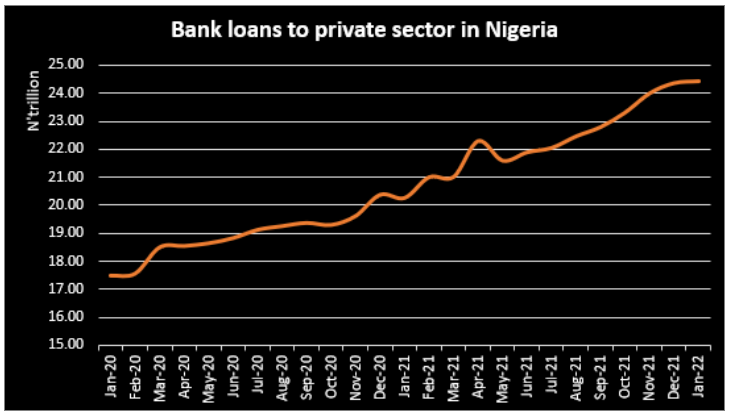
Credit Growth in Nigeria's Private Sector Slumps
In the first half of 2025, credit to Nigeria’s private sector experienced a significant decline, dropping by N1.89tn. This reduction was driven by high borrowing costs and tight liquidity conditions, which prompted companies and households to reduce their debt levels. The Central Bank of Nigeria (CBN) reported this trend in its latest money and credit statistics, showing that private-sector credit fell from N78.02tn in December 2024 to N76.14tn in June 2025.
This drop reflects the ongoing impact of a monetary policy that prioritizes stability over credit expansion. The CBN has maintained its benchmark interest rate at a restrictive level throughout 2025, following a series of steep increases in 2024 that brought the Monetary Policy Rate (MPR) to one of its highest levels in recent decades. By keeping rates high, the central bank has made new borrowing more expensive, leading many businesses to use available cash flows to repay existing debt instead of taking on new obligations.
Despite the contraction, the private sector continues to dominate the credit landscape in Nigeria. In June 2025, private borrowers accounted for 76.24% of net domestic credit, amounting to N76.14tn out of a total of N99.86tn. This contrasts with government borrowing, which stood at 23.76%, or N23.73tn. This pattern has remained consistent throughout the year, highlighting banks' greater willingness to lend to private entities compared to public institutions.
The monthly data reveals shifting credit dynamics in 2025. Private-sector loans started at N77.38tn in January, already lower than the December level as firms adjusted their balance sheets at the beginning of the year. February saw a steeper decline to N76.26tn, a decrease of N1.12tn or 1.45%. March continued the downward trend, albeit slightly, with private-sector credit falling to N75.98tn. April brought an unexpected rebound to N78.08tn, likely due to seasonal working-capital needs ahead of mid-year demand cycles.
However, this recovery was short-lived. May saw a slight drop to N77.83tn, followed by a sharp decline in June to N76.14tn, marking the steepest monthly fall so far. This drop wiped out nearly all gains made in April. Meanwhile, government borrowing showed more volatility, spiking from N25.03tn in January to N27.11tn in February before plunging to N24.59tn in March.
Government borrowing fluctuated further in April, reaching N23.93tn, then rising briefly to N25.08tn in May before retreating again to N23.73tn in June. The combined effect of reduced lending to both sectors caused net domestic credit to fall from N102.90tn in May to below the N100tn mark in June, closing at N99.86tn—the first such drop this year.
Comparing figures from June 2025 with those from the same period in 2024, the credit landscape still appears larger in absolute terms. Private-sector credit was N2.94tn, or 4.02%, higher than the N73.19tn recorded in June 2024. However, government credit saw a slight decline, falling by N0.20tn or 0.86% from N23.93tn. Overall, net domestic credit grew by N2.74tn, or 2.82%, from N97.12tn to N99.86tn.
The sustained pressure on credit growth underscores the CBN’s commitment to controlling inflation and stabilizing the naira before easing its policy. For borrowers, this means that servicing existing loans remains costly, and the threshold for securing new loans is higher.
Recent surveys highlight the challenges faced by businesses. The PUNCH reported that high interest rates were identified as the most severe constraint affecting operations in June 2025, surpassing long-standing issues like insecurity and poor electricity supply. According to the CBN’s June 2025 Business Expectations Survey, high interest rates scored 75.6 on the constraint index, closely followed by insecurity at 75.2 and insufficient power supply at 74.3.
The CBN’s Monetary Policy Committee (MPC) has kept the MPR unchanged at 27.5% for the third consecutive time in 2025. Governor Olayemi Cardoso stated that the decision was aimed at sustaining disinflation momentum and containing emerging inflationary pressures. He emphasized that the policy stance would remain unchanged until risks to inflation had sufficiently declined.
While the MPC’s cautious approach has been supported by encouraging year-on-year inflation figures, the recent uptick in monthly inflation suggests that underlying price pressures persist. Global geopolitical tensions and tariff wars also pose risks to supply chains and import costs.
Despite these efforts, business leaders have expressed concerns about the burden of high interest rates. Dr. Chinyere Almona, Director-General of the Lagos Chamber of Commerce and Industry, warned that maintaining the MPR at 27.5% places a heavy burden on businesses and urged a reduction in the rate.
